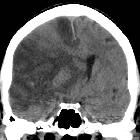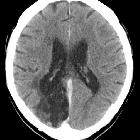acquired intracranial herniation

Central
herniation • Brain herniation types - Ganzer Fall bei Radiopaedia

Brain
herniation • Cerebellar infarct with upward transtentorial herniation - Ganzer Fall bei Radiopaedia

Brain
herniation • Kernohan phenomenon - Ganzer Fall bei Radiopaedia

Brain
herniation • Astrocytoma - WHO grade II - Ganzer Fall bei Radiopaedia

Brain
herniation • Ascending transtentorial herniation - Ganzer Fall bei Radiopaedia

Brain
herniation • Cerebral herniation - Ganzer Fall bei Radiopaedia

Subdural
hemorrhage • Subdural hemorrhage - acute - Ganzer Fall bei Radiopaedia

Duret
hemorrhage • Subdural hematoma, uncal herniation and Duret brainstem hemorrhage - Ganzer Fall bei Radiopaedia
Brain herniation, also referred to as acquired intracranial herniation, refers to shift of brain tissue from its normal location, into an adjacent space as a result of mass effect. It is a life-threatening condition that requires prompt diagnosis.
Pathology
There are a number of different patterns of brain herniation that describe the type of herniation occurring:
- subfalcine herniation
- transalar herniation: ascending and descending
- transtentorial herniation
- downward: uncal herniation and central herniation
- upward: ascending transtentorial herniation
- tonsillar herniation
- extracranial (transcalvarial) herniation
- paradoxical brain herniation
Etiology
Any intracranial mass can have this effect:
- intracranial hemorrhage
- cerebral swelling
- cerebral infarction
- peritumoural or periabscess edema
- tumors
- brain tumors
- meningioma
- base of skull tumors
- suprasellar tumors
- cerebral abscess
See also
Siehe auch:
- Meningeom
- Intrazerebrale Blutung
- Hirnabszess
- subdurales Hämatom
- Tumoren der Hypophysenregion
- Ischämischer Schlaganfall
- transalar herniation
- epidurales Hämatom
- Intrakranielle Blutung
- ascending transtentorial herniation
- Einklemmung Foramen magnum
- Hirntumoren
- transtentorielle Herniation
- Duret Blutungen
- subfalzine Herniation
- Hirndruck
- kernohan's phenomenon
- paradoxe Hirnherniation
- zerebraler Mittellinienshift
- temporal herniation
- Herniation durch die Kalotte
- extra cranial brain herniation
- Hirntotdiagnostik
- Herniation von Hirngewebe in durale Sinus
und weiter:

 Assoziationen und Differentialdiagnosen zu Hirnherniation:
Assoziationen und Differentialdiagnosen zu Hirnherniation:















